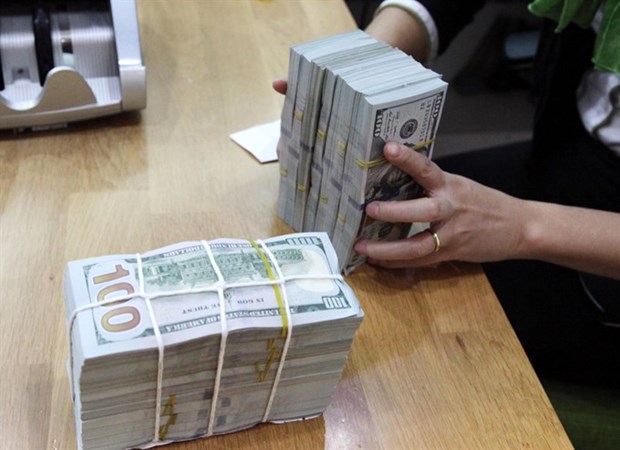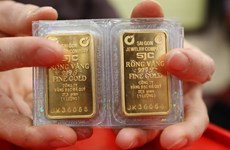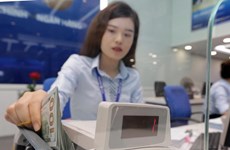Foreign exchange reserves at record high of 42 billion USD
Vietnam’s foreign exchange reserves are at an all-time high of 42 billion USD, Le Minh Hung, Governor of the State Bank of Vietnam (SBV), said at the monthly cabinet meeting on July 3.
 Dollar notes being counted at a Vietnamese bank. (Photo: VNA)
Dollar notes being counted at a Vietnamese bank. (Photo: VNA)Hanoi (VNA) – Vietnam’s foreign exchange reserves are at an all-time high of 42 billion USD, Le Minh Hung, Governor of the State Bank of Vietnam (SBV), said at the monthly cabinet meeting on July 3.
The reserves have increased by roughly 1 billion USD against the end of last year.
The rise was reported in the context of the foreign exchange rate in the domestic market being relatively stable, but the trade deficit returning.
Though the daily reference dong/dollar exchange rate listed by the central bank in the first five months of this year rose more than 1 percent against the start of the year, the rate quoted in commercial banks and in the unofficial market dropped by 0.12 percent and 1.5 percent, respectively.
However, after achieving trade surplus last year, the country posted a trade deficit of 2.7 billion USD in the first six months, equal to 3.4 percent of the country’s total trade turnover.
To expand the foreign reserves, in the first half of 2017, the central bank increased the buying rate for the greenback at its transaction centre thrice, posting a total increase of 150 VND. The latest hike of 50 VND was made on June 19, raising its buying rate for the US dollar from commercial banks to 22,725 VND per dollar.
Analysts say the buying rate hike at SBV’s centre is aimed at encouraging commercial banks to buy dollars from currency holders at higher rates. The banks will then sell dollars to SBV’s centre, helping the central bank further build foreign reserves to prepare for any fluctuation that may occur if the US Federal Reserve (Fed) increases interest rates.
At the meeting, Hung said the liquidity of the domestic foreign exchange market was good and met the demands of local organisations and individuals.
The forex market had been also stable, considering that the Fed had so far increased interest rates three times this year.
Banking expert Can Van Luc explained the reasons for this stability.
Apart from the fact that world financial markets witnessed no fluctuation, the SBV’s flexible central rate management mechanism ensured that the domestic foreign exchange market was less affected by global factors.
Besides this, the domestic supply-demand relationship with the dollar was relatively stable. Foreign currency supply from exports, foreign direct investments (FDI), official development assistance (ODA) disbursement, tourism and remittances had grown positively in the first five months, Luc said.
Hung forecast that the Fed would likely make another interest rate hike this year. The SBV would actively watch the domestic and global foreign exchange markets and take timely measures to ensure good domestic foreign exchange liquidity and avoid speculation.
“The State Bank of Vietnam is capable of controlling and stabilising the forex market as directed by the Government,” Hung said.-VNA













